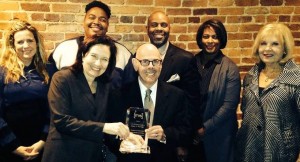
Top Row: Tracy Doz Tragos, Darius Clark Monroe, Byron Hurt, Dawn Porter, Pat Harrison; Front: Sally Jo Fifer and Rep. Henry Waxman
“It is a treat seeing the product of legislation we wrote in the 80s,” said Rep. Henry Waxman at an Independent Television Service award ceremony for him. “The rich and powerful often get their way in D.C., but the poor and marginalized don’t get their story told.”
Waxman, who is widely beloved for his pragmatic and conscientious struggle to leverage government for the good of many, whether in health care, the environment or the media, was remembering the 1988 legislation he shepherded, which created ITVS.
Make a difference.
“If you organize the right people, follow the facts, and force the issue, it is possible, and even likely, that good work can make a difference in the lives of millions,” Waxman once wrote. ITVS president Sally Fifer quoted those words back to him, as she heralded his role in the “policy miracle” that is ITVS and presented him with an award.
ITVS was created as a result of a ten-year fight by independent filmmakers for space on public television. Waxman architected a deal to dedicate some of the Corporation for Public Broadcasting’s funding for a special service to produce independent work—ITVS. “The whole idea of public broadcasting is that we want to do something that commercial broadcasters won’t do on their own!” said Waxman as he accepted the award.
For years, the improbable project looked like it might not survive, and at the time, CPB staffers would not have shed tears, either. “CPB hated the deal,” recalled Waxman matter-of-factly over the hors d’oeuvres.
Diversity in media.
But over the years, and with the leadership of Fifer, ITVS has become a bulwark of public television, and key to mission. ITVS programming provides diversity in American media, allows Americans to hear and see perspectives of people like them, encourages productive conversation, engages dialogue on thorny issues. (That’s certainly why I am honored to be a member of the ITVS board.)
These days, ITVS programming airs on a national PBS schedule–check if your local station carries it–and CPB celebrates ITVS programming. At the award ceremony, CPB head Pat Harrisonsingled out ITVS programming on graduates such as “Los Graduados,” for helping to raise the high-school graduation rate in America. “These stories remind us of what our American DNA is,” she said.
Fifer pointed to a history of important work: “The Invisible War,” which spurred legislation on sexual assault in the military; to “Two Towns of Jasper,” a film that sensitively opened a dialogue on racial conflict; and “The Farmer’s Wife,” about the struggle to keep a family farm open.
Documentarians and public TV.
ITVS-supported filmmakers celebrated the role of ITVS and of public television in making their work meaningful to many. Veteran filmmaker Dawn Porter (“Spies of Mississippi“) talked about it as a family, and called out Waxman as a “secret documentarian” for his public-interest passion. First-timer Darius Clark Monroe (“Evolution of a Criminal“) said he couldn’t wait to see his film on PBS, because “we were raised on public TV.” Tracy Droz Tragos (“Rich Hill“) called public TV “invaluable” for reaching the widest possible audience with her film about her home town, like so many where young people cannot seem to find their future. And Byron Hurt (“Soul Food Junkies“) recalled his inspiration, Marlon Riggs, whose work was featured on public TV: “I would not be able to have my career without ITVS.”
Waxman stood in front, a delighted smile on his face as he watched the speakers and the clips. Waxman expressed a paternal pride in ITVS, along with great respect for independent filmmakers’ influence. “When you want to advance legislation,” he said, “hearing people’s stories can bring it home. They won’t meet those people on the streets of DC. The work you do is remarkable.”
The diversity on stage and on screen was itself a testimonial to the distinctive contribution of ITVS and public TV, and to his own contribution to it.
